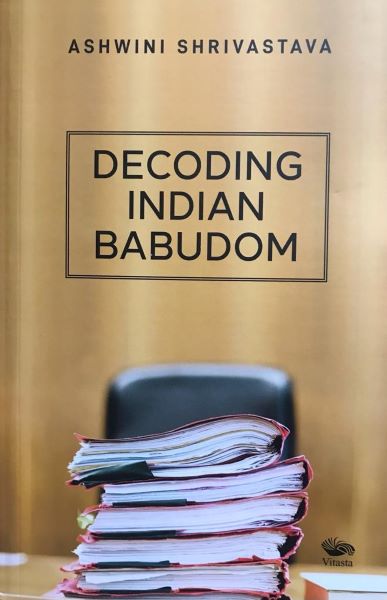
By Law Kumar Mishra
Deputation of willing and eligible armed forces officers in civil ministries and in different state government departments like RTOs and property registration offices besides creation of a ‘model’ government office in villages are among 15-sutras of good governance suggested in a latest book on bureaucracy by a journalist Ashwini Shrivastava.
The book, ‘Decoding Indian Babudom’, mentions ailments of the country’s bureaucratic system from the common man’s point of view besides suggesting ways to improve it.
The author highlights possible causes of alleged organised corruption in some property registry offices, RTOs, civic authorities among other departments, red tape, ineffectiveness of administration in ensuring ease of accessing governance and existence of unprofessional approach from a large number of ‘public servants’ towards the public, in the book.
He also weighs the efficacy of the country’s administrative system, recruitment agencies and anti-corruption watchdog like Lokpal among others from the common man’s perspective in an easy to read and understand format.
The book suggests ’15 sutras’ of good governance to ensure effective and efficient administration in the country.
Shrivastava, who hails from Madhya Pradesh’s Bhopal and has been writing on bureaucracy and governance related matters for over a decade.
“There are myths and misnomers associated with the country’s bureaucracy as governance in a vast and vivid country like India cannot be easily understood by an outsider for different reasons. The book tries to unravel common realistic misconceptions attached with bureaucracy and suggest ways to improve the functioning of government employees and hence the governance,” said Shrivastava, who works with a premier news agency at its Delhi headquarters.
The recently-launched book, brought out by Delhi-based Vitasta Publishing, suggests posting of defence services and armed forces officers in civil departments as they possess and practise all office work that might be handled by civil servants.
“The government may consider bringing on deputation or on fixed term basis, eligible and willing officials from the defence forces – the Army, Navy and Air Force – and from central armed police forces, like the Central Reserve Police Force (CRPF), National Security Guard (NSG), Border Security Force (BSF) among others, to man posts in civil ministries like road transport, commerce, culture and personnel,” Shrivastava says in the book.
These officers can also be deployed at suitable posts in municipal councils and corporations besides Regional Transport Offices (RTOs) and excise departments, as a test case under the jurisdiction of the state governments, he suggests.
This suggestion, the author feels, has the potential to check corruption, red tape and tardiness in government offices.
Imagine what kind of reform this measure may bring, considering the kind of hard discipline the armed forces personnel follow while performing their duty in defending the country’s frontiers, he says.
Citing the success story of Clean India Mission, the book recommends ‘swachh departments’ in the governments which are free from corruption and are efficient.
“How about a special reward scheme for somebody who makes a unit, section, division, wing or an organisation corruption free?” it asks.
The book emphasises on ‘model village office’ – a state-of-the-art office that can act as a role model for others in working efficiently and diligently.
“The workforce at the state level needs to be trained efficiently. There has to be training for them for skill upgrade and on the nuances of clean and efficient governance,” it suggests.
The book talks in a most reader-friendly way about different issues related to the country’s governance like privatisation, digitisation, recruitment of more women in government departments and instances of frequent transfer and posting of government employees in ‘public interest’, and mentions ten award-winning success stories of civil servants among others.
The book also terms “priority to output and not outcome” and “air-conditioned governance” as ailments affecting the administration.
“Civil servants need to be outcome-oriented instead of delivering some output. Whether or not one does any constructive work there would definitely be some output, but it may not yield the right outcome,” it says.
There is a need to make some modifications in the way government employees work and bring in innovations as there cannot be a one-size-fits-all kind of solution for governance related issues in a vast country like India, the book adds.



